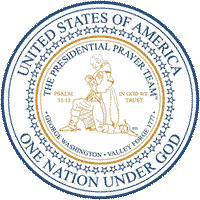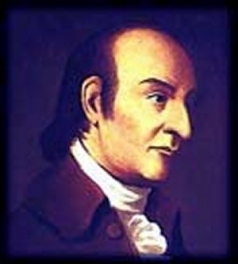
thanks to wanda barton
The Presidential Prayer Team has a goal of
mobilizing millions of people to pray for our President,
our leaders, our nation and our Armed Forces. I Timothy 2: 1-2
God Bless America

This is the man Charles Warren, the great historian of Law, called "the father of the Bill of Rights." He is generally regarded as "The Father of American Jurisprudence." But in his home state of Virginia, there was a scandal to his personal life, an "open secret" that no one in that slave society quite knew how to deal with.
Thomas Jefferson wrote of him, "No man has ever left behind him a character more venerated than George Wythe.... His virtue was of the purest tint ;his integrity inflexible, and his justice exact ;of warm patriotism, and, devoted as he was to liberty, and the natural and equal rights of man, he might be called the Cato of his country.
We are told that his mother, a devout Quaker, had a profound influence on him. Orphaned as an infant when his father died, his Quaker mother undertook raise him. Being an unusually well educated woman for her time, she tutored young George in Latin and Greek, as well as other subjects, and by the time he was a teen, George had an excellent education. She also instilled many Quaker ideals into George which he was later to carry with him into public life. Above all was a kind of Quaker integrity -- he had learned an unflinching adherence to the Inner Light of conscience.
Thus, in adulthood he was unafraid to make an unpopular ruling, even when it outraged his electorate. For example, he authored a number of opinions that undermined the institution of slavery. Wythe's Quaker-influenced upbringing led him to advocate for the equality of women, humane treatment of the mentally ill, the rights of Blacks and Indians, co-equal education of boys & girls, religious liberty, separation of church and state, and freedom of thought and speech. These Quakerly attributes made him on the one hand notorious, but on the other hand respected. In his later years, Wythe was still known for his outdated "plain" Quaker dress and broad-brim, as well as his gentle manner, which it was said could cause even a surly dog to "unbend and wag his tail."
|
A slaveholder, Wythe became an abolitionist, freeing his slaves and providing for their support. Wythe provided for his slaves, Lydia Broadnax and her son, Michael Brown, in his will. The will also contained a provision for Brown's education. According to Jefferson biographer Fawn Brodie, Broadnax was almost certainly Wythe's concubine, and Brown was his son. Wythe's other heir, his great-nephew, George Wythe Sweney, decided to avoid this dilution of his fortune by poisoning the slaves with arsenic. In the process, he accidentally killed Wythe as well, though Wythe lingered long enough to change his will to eliminate his bequest to his murderer. Broadnax survived the poisoning. It was the only punishment his killer received. Sweney was acquitted of murder in Virginia, primarily because of a law that forbade the testimony of black witnesses. Sweney was tried for forgery, and convicted, but that was overturned on appeal and Sweney is said to have gone to Tennessee, stolen a horse, and served a term in a penitentiary. The rest of his life was then lost to history. Wythe, in his will, left his extraordinary book collection to Thomas Jefferson who described his mentor and friend by stating: "He was my ancient master, my earliest and best friend, and to him I am indebted for first impressions which have [been] the most salutary on the course of my life." |
The Interracial Scandal that Rocked Virginia
Fawn Brodie describes the George Wythe tragedy in relation to Thomas Jefferson:
George Wythe - the Father of American JurisprudenceWhen Love makes the highest Sacrifice
No death during Jefferson's presidency brought him the peculiar kind of agony that came with the murder of his old law teacher George Wythe. On June 4, 1806, he received a letter from William Duval in Richmond saying that Wythe was dying of poisoning, that his free mulatto boy named Michael Brown was already dead, and that arsenic had been found in the bedroom of Wythe's grandnephew, George Sweney. Duval, who had first been told that Wythe was ill of cholera, wrote in horror, "We had no idea that Sweney had poisoned the whole family." The "whole family" consisted of Wythe, a widower since the death of his second wife in 1787, a mulatto housekeeper named Lydia Broadnax, and her son Michael Brown. All had been poisoned when they ate strawberries and drank coffee which had been liberally dosed with arsenic.Wythe, who had no children of his own by his two wives, but had befriended his grandnephew "like a son," had written a will on April 20, 1803, in which he left his house and a good deal of his property to Lydia Broadnax and another former slave named Benjamin. He had left half his bank stock to the young mulatto Michael, with instructions that Thomas Jefferson be the executor in charge of his "maintenance, education & other benefit." The remainder of his bank stock he willed to Sweney, with the provision that he would get it all should Michael Brown die before him. The boy died of the poison; his mother survived. Wythe lived long enough to assert that he had been murdered, and to cut Sweney out of his will altogether. By the time Jefferson was told of these details, Sweney was in jail not only charged with murder but also with having forged several checks in Wythe's name.
Duval described Lydia Broadnax to Jefferson as follows:"Never had a man a more faithful servant, her attention to Mr. Wythe was incessant and always studied to please him." "Michael Brown," he said, "was humble and good -- he had caught the suavity of his Master's manners." When the dying Wythe heard of Michael's death, Duval said, "he made a long Breath -- and pathetically said -- Poor Boy." Duval sent Jefferson a copy of Wythe's will, which as it turned out included not only a request that he serve as executor for Michael Brown's education, but also a bequest to Jefferson of his two silver cupps, his gold-headed cane, and his entire superb library.
The distraught Jefferson wrote back, "Such an instance of depravity had been hitherto known to us only in the fables of the poets. . . . He was my antient master, my earliest & best friend. . . . I had reserved with fondness for the day of my retirement, the hope of inducing him to pass much time with me." Whether Jefferson noted with more than passing interest the date of Wythe's will one cannot know. April 20, 1803, was relatively recent; it represented that period in Jefferson's life when he had weathered the worst of the Callender publicity but had not repudiated his slave mistress or her children either by public pronouncement or by private deed, such as sending them away from Monticello. Jefferson must have surmised, with many others in Virginia once the details of the will were circulated, that Lydia Broadnax was almost certainly Wythe's concubine and Michael Brown his son. That the President believed that Wythe had waited in writing his will till he was certain he could count on Jefferson's support for his son seems likely. Jefferson wrote with regret of the boy's death to Duval, ". . . not only for the affliction which it must have cost Mr. Wythe, but also it has deprived me of an object for the attentions * which would have gratified me unceasingly with the constant recollection & execution of the wishes of my friend." He asked Duval for a portrait of Wythe, and when told that Lydia Broadnax had a profile engraving he asked for a copy. The housekeeper, as it turned out, kept the copy, and insisted that Jefferson be given the original.
Sweney's trial was the sensation of Richmond. For a white man to leave a house and grounds to his mulatto housekeeper, and bank stock to her yellow son, and to ask none other than the President of the United States to be responsible for the boy's education seemed such an obvious advertisement of the boy's paternity that it left many of the citizens of Richmond aghast. Edmund Randolph and William Wirt rushed to defend Sweney, and since under Virginia law no black could testify against a white man, he was acquited. He was found guilty of forging checks in his uncles's name, but even this charge was dropped on appeal. The indictment against Sweney for poisoning Michael Brown was "quashed without a trial." Thus, the whole legal paraphernalia of Virginia was perverted to absolve the forger and murderer and to dramatize the legal sanction of the murder of a man who would so advertise his miscegenation. The fact that Wythe was one of Virginia's most distinguished sons, and a signer of the Declaration of Independence, only served to make it more imperative that his gesture be repudiated and buried in the most expeditious fashion possible. [Imogene Brown takes offense at Brodie's account.]
The legal exoneration of George Wythe Sweney was also a public warning to Thomas Jefferson. Nothing could have furnished more dramatic evidence of the hatred of Virginia whites for the man who conveyed by public or legal gesture his acceptance of a yellow child. If Jefferson periodically cherished fantasies that in time there might be some kind of equality for Sally Hemings' children, this again would have jolted him back to reality. It is clear enough that there was only one possible solution for these children if they were to have a [fair?] and even decent life; they must be somehow schooled and permitted to pass into white society. That this had already happened to Sally's eldest son has been suggested in an earlier chapter. In 1806 when Wythe was poisoned, Sally Hemings was thirty-three, Jefferson sixty-three. That he was forced ever more certainly into the conflicts and ambiguities of silence concerning his slave family is increasingly obvious. Still, there are faint echoes and footprints in the records.

The Presidential Prayer Team has a goal of
mobilizing millions of people to pray for our President,
our leaders, our nation and our Armed Forces. I Timothy 2: 1-2
God Bless America




Site maintained by
Robert Shepherd